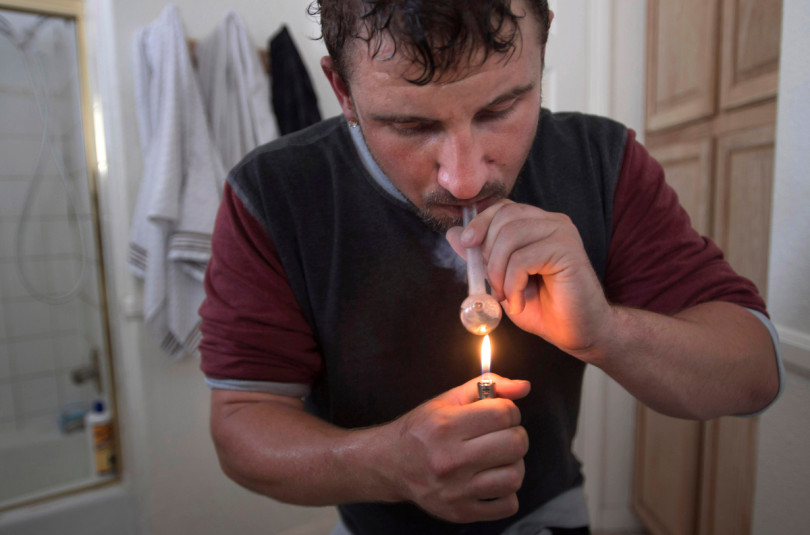Public hearing on addiction treatment: What actually works?


Timmy Solomon lights a glass pipe of crystal meth in the bathroom of his sober living home in San Clemente in May, 2017. He closes the window and turns the shower to steaming hot to disguise the smell. He said he got the meth a few days earlier from another addict at their outpatient treatment center in San Juan Capistrano. Less than an hour later his housemates call the house manager to report him being high. A few hours later he’s kicked out and sent to Mission Hospital Laguna Beach where he spends the night. (Photo by Mindy Schauer, Staff File)

Chairs are packed, leaving standing room only during a discussion on sober-living homes at the San Clemente Community Center in San Clemente in 2016. (Photo by Matt Masin, Orange County Register, SCNG)

Wendy McEntyre of Sky Forest lost her son, Jarrod, to an overdose in a sober living home in the San Fernando Valley in 2004. Twenty-four men were living in the three-bedroom, two-bath house at the time, and one brought in speedballs to share. McEntyre founded the nonprofit Jarrod’s Law in his memory and began fighting to change California’s laws. AB 920 is named in his honor. (Photo by Mindy Schauer, Orange County Register/SCNG)

Gabe Chaves, left, and Jeff Dougherty, dubbed the Junkie Hunter, center, find addicts on the street like Timmy, foreground, to get them into rehab through their organization Foundations for Recovery. Today their patience grows thin as Timmy stalls to get high after saying he would let them drive him to a sober living home in Whittier. (Photo by Mindy Schauer, Orange County Register/SCNG)

An overview of a sober living home on Via Lampara, San Clemente, and its neighbors. (Courtesy of Orange County Superior Court case file of Hurwitz et al v. Scolari)


Assemblymember Cottie Petrie-Norris, D-Laguna Beach, center, announced a new bi-partisan Legislative Substance Abuse Treatment Working Group to push for better regulation of California’s addiction treatment industry on Tuesday, June 4. Behind her from left is activist Wendy McEntyre, Assemblymember Marie Waldron, R-Escondido, Assemblymember Henry Stern, D-Calabasas, Sen. Jerry Hill, D-San Mateo; and Assemblymember Bill Brough, R-Dana Point. (Courtesy Assemblymember Cottie Petrie-Norris)
COSTA MESA — After a legislative session that sent a quartet of reform bills to the governor’s desk, Assemblymember Cottie Petrie-Norris will hold a hearing on California’s still-loosely-regulated addiction treatment industry at Costa Mesa City Hall at 11 a.m. on Wednesday, Oct. 30.
Southern California remains ground zero of the Rehab Riviera, with nearly 1,000 of California’s 1,800 licensed or certified addiction treatment facilities clustered in just four counties: Orange, Los Angeles, Riverside and San Bernardino. The industry has been targeted with allegations of widespread fraud.
The hearing’s goals are to explore remaining gaps in California’s system of regulation and enforcement, compare California’s approach to that of other states, and hear from recovery-industry experts about what could and should be done to better protect patients seeking help — as well to as preserve the peace in neighborhoods around treatment facilities.
There will be three panels. The first, “The Recovery Experience: How have clients, their families, and providers been impacted?” will feature testimony from Wendy McEntyre, whose son Jarrod died in a sober living home from a drug overdose; Nancy Clark, executive director of The Recovery Center; and Sal Landers, former owner and co-manager of a sober living home.
The second panel, “Industry Experts: What is real treatment?” will focus on how to build a system that emphasizes a medical approach to addiction issues. Jennifer Lohse, vice president and general counsel of the Hazelden Betty Ford Foundation, and Randolph Holmes, chair of the public policy committee for the California Society of Addiction Medicine, will speak.
The last panel, “Law Enforcement: How can we respond to unscrupulous operators?” will include Katrina Foley, mayor of Costa Mesa; Tracy Hughes, senior deputy district attorney for the Orange County District Attorney’s Office; and Jeff Hallock, assistant sheriff with the Orange County Sheriff’s Department.
There will also be time for public comments.
“Historically, only individuals with the most severe substance abuse disorders received treatment in addiction treatment programs that were originally designed in the early 1960s to treat addictions as personality or character, i.e. ‘social,’ disorders… Services for the prevention and treatment of substance abuse have traditionally been delivered separately from other mental health and general health care services,” says a backgrounder about the rehab industry published recently by the Assembly Committee on Accountability and Administrative Review.. Petrie-Norris, D-Laguna Beach, chairs that committee.
The recent expansion of insurance coverage for addiction treatment, combined with a heightening opioid crisis, created an environment ripe for profiteering and fraud. The Southern California News Group’s ongoing probe of the Rehab Riviera documents that little has changed at the community level, despite new laws in Sacramento.
Sober living homes — substance-free living environments usually paired with inpatient or outpatient addiction treatment — have been particularly fraught with problems, the backgrounder says. But since addiction is a disability under federal law, sober homes have little to no oversight or regulation, which reformers argue is not good for anyone.
“These regulatory gaps make it impossible to know the quantity of sober living home facilities, the type and quality of services they provide, and the standards and requirements under which they operate,” said the American College of Physicians in a 2018 letter to the federal Substance Abuse and Mental Health Services Administration, urging stricter oversight of sober homes.
The hearing is expected to wrap up by 2 p.m. City Hall is at 77 Fair Drive in Costa Mesa. Information presented at the hearing, including community input, will help shape the 2020 legislative agenda on the issue, which lawmakers hope will make fundamental reforms rather than tinker around the edges.
 Pathways Drug Rehabilitation Luxury Addiction Treatment & Detox Center
Pathways Drug Rehabilitation Luxury Addiction Treatment & Detox Center









